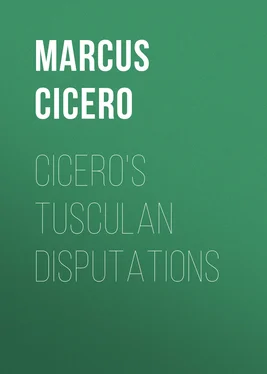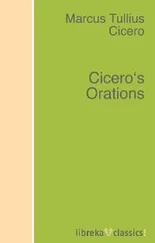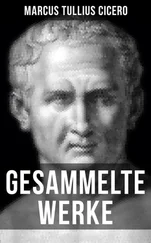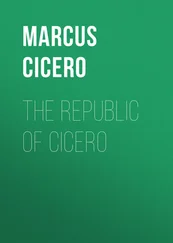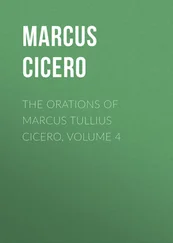Marcus Cicero - Cicero's Tusculan Disputations
Здесь есть возможность читать онлайн «Marcus Cicero - Cicero's Tusculan Disputations» — ознакомительный отрывок электронной книги совершенно бесплатно, а после прочтения отрывка купить полную версию. В некоторых случаях можно слушать аудио, скачать через торрент в формате fb2 и присутствует краткое содержание. Издательство: Иностранный паблик, Жанр: foreign_antique, Философия, foreign_edu, на английском языке. Описание произведения, (предисловие) а так же отзывы посетителей доступны на портале библиотеки ЛибКат.
- Название:Cicero's Tusculan Disputations
- Автор:
- Издательство:Иностранный паблик
- Жанр:
- Год:неизвестен
- ISBN:нет данных
- Рейтинг книги:3 / 5. Голосов: 1
-
Избранное:Добавить в избранное
- Отзывы:
-
Ваша оценка:
- 60
- 1
- 2
- 3
- 4
- 5
Cicero's Tusculan Disputations: краткое содержание, описание и аннотация
Предлагаем к чтению аннотацию, описание, краткое содержание или предисловие (зависит от того, что написал сам автор книги «Cicero's Tusculan Disputations»). Если вы не нашли необходимую информацию о книге — напишите в комментариях, мы постараемся отыскать её.
Cicero's Tusculan Disputations — читать онлайн ознакомительный отрывок
Ниже представлен текст книги, разбитый по страницам. Система сохранения места последней прочитанной страницы, позволяет с удобством читать онлайн бесплатно книгу «Cicero's Tusculan Disputations», без необходимости каждый раз заново искать на чём Вы остановились. Поставьте закладку, и сможете в любой момент перейти на страницу, на которой закончили чтение.
Интервал:
Закладка:
Where the cold northern blasts, with horrid sound,
Harden to ice the snowy cover’d ground;
the other, towards the south pole, is unknown to us, but is called by the Greeks ἀντίχθονα: the other parts are uncultivated, because they are either frozen with cold, or burned up with heat; but where we dwell, it never fails, in its season,
To yield a placid sky, to bid the trees
Assume the lively verdure of their leaves:
The vine to bud, and, joyful, in its shoots,
Foretell the approaching vintage of its fruits:
The ripen’d corn to sing, while all around
Full riv’lets glide; and flowers deck the ground:
then the multitude of cattle, fit part for food, part for tilling the ground, others for carrying us, or for clothing us; and man himself, made, as it were, on purpose to contemplate the heavens and the Gods, and to pay adoration to them: lastly, the whole earth, and wide extending seas, given to man’s use. When we view these and numberless other things, can we doubt that they have some being who presides over them, or has made them (if, indeed, they have been made, as is the opinion of Plato, or if, as Aristotle thinks, they are eternal), or who at all events is the regulator of so immense a fabric and so great a blessing to men? Thus, though you see not the soul of man, as you see not the Deity, yet, as by the contemplation of his works you are led to acknowledge a God, so you must own the divine power of the soul, from its remembering things, from its invention, from the quickness of its motion, and from all the beauty of virtue. Where, then, is it seated, you will say?
XXIX. In my opinion, it is seated in the head, and I can bring you reasons for my adopting that opinion. At present, let the soul reside where it will, you certainly have one in you. Should you ask what its nature is? It has one peculiarly its own; but admitting it to consist of fire, or air, it does not affect the present question. Only observe this, that as you are convinced there is a God, though 40you are ignorant where he resides, and what shape he is of; in like manner you ought to feel assured that you have a soul, though you cannot satisfy yourself of the place of its residence, nor its form. In our knowledge of the soul, unless we are grossly ignorant of natural philosophy, we cannot but be satisfied that it has nothing but what is simple, unmixed, uncompounded, and single; and if this is admitted, then it cannot be separated, nor divided, nor dispersed, nor parted, and therefore it cannot perish; for to perish implies a parting-asunder, a division, a disunion, of those parts which, while it subsisted, were held together by some band. And it was because he was influenced by these and similar reasons that Socrates neither looked out for anybody to plead for him when he was accused, nor begged any favor from his judges, but maintained a manly freedom, which was the effect not of pride, but of the true greatness of his soul; and on the last day of his life he held a long discourse on this subject; and a few days before, when he might have been easily freed from his confinement, he refused to be so; and when he had almost actually hold of that deadly cup, he spoke with the air of a man not forced to die, but ascending into heaven.
XXX. For so indeed he thought himself, and thus he spoke: “That there were two ways, and that the souls of men, at their departure from the body, took different roads; for those which were polluted with vices that are common to men, and which had given themselves up entirely to unclean desires, and had become so blinded by them as to have habituated themselves to all manner of debauchery and profligacy, or to have laid detestable schemes for the ruin of their country, took a road wide of that which led to the assembly of the Gods; but they who had preserved themselves upright and chaste, and free from the slightest contagion of the body, and had always kept themselves as far as possible at a distance from it, and while on earth had proposed to themselves as a model the life of the Gods, found the return to those beings from whom they had come an easy one.” Therefore, he argues, that all good and wise men should take example from the swans, who are considered sacred to Apollo, not without reason, but particularly because they seem to have received 41the gift of divination from him, by which, foreseeing how happy it is to die, they leave this world with singing and joy. Nor can any one doubt of this, unless it happens to us who think with care and anxiety about the soul (as is often the case with those who look earnestly at the setting sun), to lose the sight of it entirely; and so the mind’s eye, viewing itself, sometimes grows dull, and for that reason we become remiss in our contemplation. Thus our reasoning is borne about, harassed with doubts and anxieties, not knowing how to proceed, but measuring back again those dangerous tracts which it has passed, like a boat tossed about on the boundless ocean. But these reflections are of long standing, and borrowed from the Greeks. But Cato left this world in such a manner as if he were delighted that he had found an opportunity of dying; for that God who presides in us forbids our departure hence without his leave. But when God himself has given us a just cause, as formerly he did to Socrates, and lately to Cato, and often to many others—in such a case, certainly every man of sense would gladly exchange this darkness for that light: not that he would forcibly break from the chains that held him, for that would be against the law; but, like a man released from prison by a magistrate or some lawful authority, so he too would walk away, being released and discharged by God. For the whole life of a philosopher is, as the same philosopher says, a meditation on death.
XXXI. For what else is it that we do, when we call off our minds from pleasure, that is to say, from our attention to the body, from the managing our domestic estate, which is a sort of handmaid and servant of the body, or from duties of a public nature, or from all other serious business whatever? What else is it, I say, that we do, but invite the soul to reflect on itself? oblige it to converse with itself, and, as far as possible, break off its acquaintance with the body? Now, to separate the soul from the body, is to learn to die, and nothing else whatever. Wherefore take my advice; and let us meditate on this, and separate ourselves as far as possible from the body, that is to say, let us accustom ourselves to die. This will be enjoying a life like that of heaven even while we remain on earth; and 42when we are carried thither and released from these bonds, our souls will make their progress with more rapidity; for the spirit which has always been fettered by the bonds of the body, even when it is disengaged, advances more slowly, just as those do who have worn actual fetters for many years: but when we have arrived at this emancipation from the bonds of the body, then indeed we shall begin to live, for this present life is really death, which I could say a good deal in lamentation for if I chose.
A. You have lamented it sufficiently in your book on Consolation; and when I read that, there is nothing which I desire more than to leave these things; but that desire is increased a great deal by what I have just heard.
M. The time will come, and that soon, and with equal certainty, whether you hang back or press forward; for time flies. But death is so far from being an evil, as it lately appeared to you, that I am inclined to suspect, not that there is no other thing which is an evil to man, but rather that there is nothing else which is a real good to him; if, at least, it is true that we become thereby either Gods ourselves, or companions of the Gods. However, this is not of so much consequence, as there are some of us here who will not allow this. But I will not leave off discussing this point till I have convinced you that death can, upon no consideration whatever, be an evil.
Читать дальшеИнтервал:
Закладка:
Похожие книги на «Cicero's Tusculan Disputations»
Представляем Вашему вниманию похожие книги на «Cicero's Tusculan Disputations» списком для выбора. Мы отобрали схожую по названию и смыслу литературу в надежде предоставить читателям больше вариантов отыскать новые, интересные, ещё непрочитанные произведения.
Обсуждение, отзывы о книге «Cicero's Tusculan Disputations» и просто собственные мнения читателей. Оставьте ваши комментарии, напишите, что Вы думаете о произведении, его смысле или главных героях. Укажите что конкретно понравилось, а что нет, и почему Вы так считаете.
